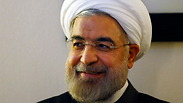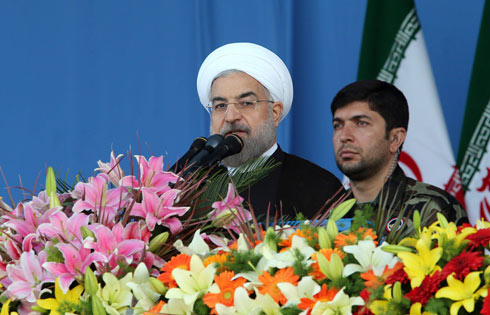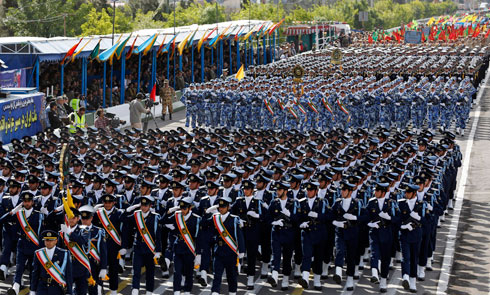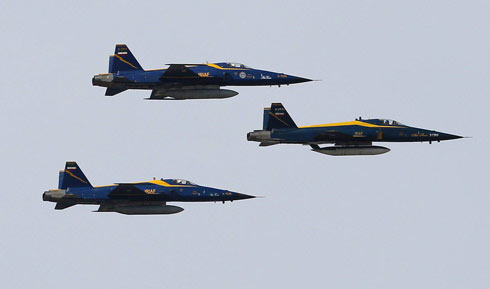
Rouhani talks peace, outreach at army parade
In conciliatory remarks made on Iran's National Army Day, Iranian president stresses country is 'not after war,' as forces with 'Death to Israel' banners march before him.
Iran's president has underscored his moderate policies and outreach to the West during a military parade marking the country's National Army Day.
Rouhani said the Islamic Republic had the might to deter any attacks as its military displayed a range of drones and missiles at an annual parade in Tehran, state television reported on Friday.
Chanting "God is Greatest", troops paraded missiles carriers, some bearing banners saying "Death to America" and "Death to Israel", armoured personnel carriers and unmanned surveillance aircraft as well as small submarines with men wearing aqua-lungs alongside.
But unlike hardline predecessor Mahmoud Ahmadinejad, Rouhani did not use his speech to lash out at the United States and Israel, which Tehran refuses to recognise.
Related stories:
- Senior Iranian official: US has been sabotaging our nuclear program
- Iranian negotiators reject hardline criticism of nuclear talks
- Rouhani says Iran sanctions will unravel in months
Referring to the ongoing negotiations between Iran and the world powers over Tehran's controversial nuclear program, Rouhani said Iran has shown it has no hostile intentions toward anyone in the world, including the United States, which has long been considered an enemy.
"During the talks, we announced to the world and we say so again ... we are not after war, we are after logic, we are after talks," Rouhani said.
He touted Iran's diplomatic outreach and said the backing of the military and the nation was crucial. "Support by the armed forces and support by our brave people have empowered the officials in charge of the talks on the diplomatic front."
The Iranian president made no mention of archfoe Israel but said Iran "will not invade any country," although it would "resist any invasion."
Rouhani also assured neighboring countries that Iran seeks better ties with them, saying that "neighbors should know that our army supports peace and stability."
The remarks were a stark contrast to Rouhani's belligerent predecessor, Mahmoud Ahmadinejad.
Since he was elected last June, Rouhani has pledged to resolve the nuclear dispute with the West and end painful economic sanctions imposed over Tehran's controversial nuclear program, which the West fears could result in the making of a nuclear weapon.
Tehran denies the charge, saying its nuclear activities – mainly those surrounding its uranium enrichment, which is a possible pathway to nuclear arms – are meant for peaceful purposes only, such as power generation and cancer treatment. Iran also asserts it has a right to enrich uranium under international law.
Iran and six world powers – the five permanent members of the UN Security Council plus Germany –reached an interim deal in November that put limits on Tehran's enrichment levels in exchange for an easing of some sanctions.
Talks are ongoing for a final deal that would remove all possibilities that the Islamic Republic could use its capabilities to build a nuclear weapon.
In Friday's parade, Iran showcased its air defense systems, including the S-200 Russian-made, medium to high altitude surface-to-air missile system designed primarily to track, target, and destroy aircraft and cruise missiles.
On display were also fighter jets such as US-made F-4 and F-14, Russian-made MIG-29 and Sukhoi-24, as well as Iran's indigenous fighter plane, Saegheh. The parade also showed off a newer version of the short range, surface-to-surface Fajr-5, Nazeat and Zelzal missiles.
Iran has tried to achieve military self-sufficiency since 1992 and has also produced light submarines and torpedoes.













